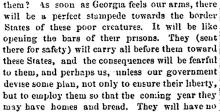THE SLAVES AS AFFECTED BY THE REBELLION.
The following are extracts from a letter written by a loyal Tennessean to gentleman in this city. They give his views of the condition of the slave as affected by the Rebellion, and will interested many as the opinions of one who had lived for many years in a Slave State and watched the working of the institution through all the recent troubles:
“The South, as we used to say she would be, is fast becoming a desolation. Her slaves are, at least in the border States, perfectly demoralized; very few of them remain with their original owners. The crack of the whip has ceased forever, and so soon, that even here where we see it, we can hardly realize the fact. It is no strange thing now to see the African well armed and equipped in our midst, with stalwart arm bearing the flag of our country. A few days since a black company raised here paraded our streets with the old silk flag of the Rock City Guard. This flag had been given in 1851 to a company of that name by the ladies of this city, embroidered by their own hands— this flag in the hands of their slaves parading our streets! If there was anything wanting to show them how low they and their cause had fallen, it was this, and so they felt it, as crowds of boys and men cheered the passing company, while their musicians played Hail Columbia.
In the Board of Claims here it is no uncommon thing to have a bill come in headed or concluded with fifteen to thirty slaves, at an average of eight or twelve hundred dollars each. The Board of course strikes these off, telling them that the United States don’t trade in that kind of stick, nor pay for mine who dare assert their freedom. The blow upon the South is fearful— they feel it; the emancipation act is the death of hem and you will see it. They are now as bitter as new convicted felons. Their sins have found them out, and repentance will come one of these days, perhaps too late. — Their entire producing power is destroyed, demoralized and defiant; every day of war makes it worse of course. This year they have made their bread. Next year they won’t make anything; how are they to do it? All negroes far from us are sent into the Gulf States for safety. The black population already very large, will double there; what then? Our armies will follow on their track; where then will thy send their slaves? If we rea tardy in our movements how are these negroes to be kept in subordination? How to be employed, how clothed and fed? What will they do with them? As soon as Georgia feels our arms, there will be a perfect stampede towards the border States of these poor creatures. It will be like opening the bars of their prisons. They (sent there for safety) will carry all before them toward these States, and the consequences will be fearful to them, and perhaps us, unless our government devise some plan, not only to ensure their liberty, but to employ them so that the coming year they may have homes and bread. They will have no difficulty in supporting themselves if you devise some system before they become a demoralized ruin. We must save this people, not only from oppression, but from vice and crime incident to a soldier’s camp. The hand of God is in this matter, we can’t stay it. Slavery, the darkest relic of the darkest age, is doomed and gone forever, but out work is not yet begun; we must save this long oppressed race from utter ruin; the Christian, the philanthropist, must put forth their strength and complete the work begin with the sword of justice; the spare lands of the South must be given to these homeless creatures; they must have some vested rights therein, at least enough to say, “I have a home.”
This is a work of great magnitude; if done completely, in ten years from the end of this war our soil will produce more cotton, sugar and tobacco than it ever did, and the foot prints od war will have passed away forever from our land. We must go on the end our hands are on the plough. God put them there, we can’t look back now, ‘tis too late. Every slave in the South is wanted there to till the soil. Give them homes, encourage them, let them feel the benefit of liberty by giving them the fruit of their toil. Why should the negroes be turned from their original quarters which their rebel masters have forfeited? In many cases the master has abandoned them and the land on which they live; in all cases have forfeited their claims to either by treason, and I believe justice should give these poor creatures homes in the land of their early sorrows and tears”
"The Slave as Affected by the Rebellion," Salem (MA) Register, December 24, 1863, p. 2.

